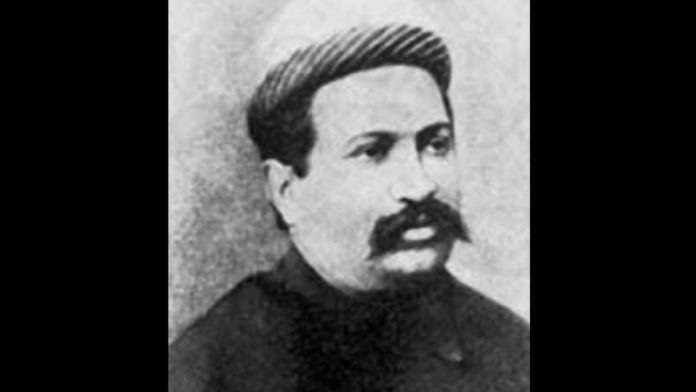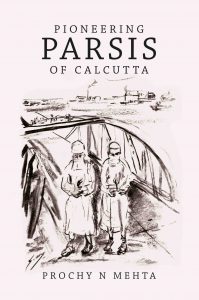In Pioneering Parsis of Calcutta, Prochy N. Mehta chronicles the little-known lives of the first Parsis who came to the city during British rule.

Jamsetjee Framjee Madon was one of the pioneers of Indian cinema. He owned over 120 cinema halls at one time. Jamsetjee was very modern in his outlook and a reformist in his religious views. He was one of the first trustees of the Late Ervad D.B. Mehta’s Zoroastrian Anjuman Atash Adaran and was a supporter of the young Bella, to whom he left Rs 5,000 in his will to help her in her legal case.
Jamsetjee Framjee Madon was born on 27 April 1856 in a very poor family in Bombay. The family being truly indigent, he had to seek employment at the tender age of twelve as a scene-shifter in the dramatic company of Cooverji Ratanji Nazir, at a salary of Rs 4 per month. The young lad got enamoured of the stage, copying the roles of the heroes and heroines of the plays and later playing small roles on stage. Since he had a good voice, he could act the part of a courtesan and became quite popular.
He then joined Elphinstone Natak Company which toured the country and in 1875, on an auspicious day, he came to Calcutta with this touring company. Some time later he took over this company in partnership with a few others. This company prospered, thanks to his experience, far-sightedness and hard work, and made Calcutta its permanent home. Simultaneously he started dealing in auctioned goods and in 1885 started another business as wines and provision merchant at 5, Dharamtalla Street. His honesty, perseverance and gentle nature soon attracted important Indian customers and the shop became extremely popular among government officers and Englishmen. There were seven branches of this store including those at Calcutta, Darjeeling, Lucknow and Delhi.
In 1903, at the time of the British invasion of Tibet, Jamsetjee opened food and provision stores all the way from Siliguri to Chumbi and assisted the armed forces in supplying food and provision to soldiers even at great personal risk. The British officers greatly appreciated Madon’s fortitude and bravery as a result of which Jamsetjee was given a large contract of supplying the army during the wars in Kabul. He carried out his work at great risk and in significantly difficult circumstances, to the utmost satisfaction of the military officers. In appreciation of these services, the British Government awarded him the Order of the British Empire in 1918.
On 30 March 1919, the Calcutta Parsis felicitated Jamsetjee at a function under the chairmanship of the trustee of the Anjuman, Seth Edulji Pestonji Guzdar. Madon Seth was congratulated on obtaining the Order of the British Empire and praised for his simple life, gentle nature, honesty and kindness and for his munificence towards the poor.
Seth Jamsetjee, like the other Parsi elders of the community, had a generous nature and was always anxious to assist the needy. Having grown up in poverty he felt for the poor and gave employment to many poor Parsi youngsters in his cinemas and shops. He was thus responsible for the livelihood of a large number of Parsi families. Many of his charities were done secretly and it can be truly said of him that his left hand was not aware of what his right hand gave away. It was estimated that such secret handouts averaged Rs 5,000 every month. This help was not restricted to Parsis exclusively; all the needy benefitted from his charity, irrespective of caste or creed. Many institutions of public welfare owed their existence and prosperity to him.
In 1907 Seth Jamsetjee took up the mission of building a second Tower of Silence in Calcutta. Starting a subscription list with his personal donation of Rs 5,000, he went from house to house and managed to collect a lakh of rupees from the Calcutta Parsis. It was due to his influence that the municipality gave a grant of Rs 27,000 towards the purchase of land for this second Tower of Silence, and he personally bore the expenses of Rs 20,000 towards building it. Seth Madon’s efforts and far-sightedness resulted in bringing together the priests of the Kadimi and Shahanshai sections for the first time in Calcutta. The Kadimi priests performed the religious rites at the time of the foundation and the Shahanshai priests performed the consecration rites.
In 1912, at the time of the building of the Mehta fire temple, Seth Jamsetjee provided his devoted services. The building attached to the fire temple used as a residence for the priests was built and donated by him and his family to the Atash Adaran. He presented several chandeliers, lamps and carpets for the main prayer hall and also many tables, chairs, large cooking utensils for general use. This generous-hearted Parsi also had the foresight to start funds with initial personal donations to take care of the future maintenance of the Atash Adaran.
Seth Jamsetjee was deeply sympathetic towards the poor Parsi families in Calcutta. In Dharamtalla Street he built Khorshed Madan Mansion at an expense of Rs 1,10,176 in memory of his beloved daughter, Mrs Khorshed Rustomji Maneckji Mehta, who had died on 14 January 1920 during the lifetime of her parents. Seth Jamsetjee donated this house to the Anjuman on the understanding that the flats be rented out to the poor and middle-class Parsi families of Calcutta at a low rent. Further he set aside a sizeable fund for the maintenance of this building.
He also secured the land for the ‘aramgah’ for the Parsis in Darjeeling and donated funds towards its maintenance. On several occasions he gave donations to the Anjuman on behalf of his friends and relations. Seth Jamsetjee organised several ‘benefit nights’ in many of his cinema houses to collect funds for charities for Parsis as well as other communities.
In 1923, the British Government honoured him with the award of Commander of the Order of the British Empire in recognition of his many cosmopolitan charities.
About twenty years prior to the advent of cinema on a commercial basis in India, Seth Jamsetjee experimented with this new media and perfected it for public viewing. He was truly a pioneer of the cinema industry in India.
The young lad of twelve, who started his career as a scene-shifter at a salary of Rs 4 per month, aided by some lucky turn of events and greatly due to his own inherent ability, perseverance and hard labour, became, in the evening of his life, the owner of a hundred cinema houses in India. Seth Jamsetjee’s life is a shining example of Parsi adventure and philanthropy. Upon his death which took place in Calcutta on roz 22 Govad, Mah 10 Dae, Year 1292 y.z., corresponding to 28 June 1923, Calcutta lost a true benefactor of the poor.

This excerpt from Pioneering Parsis of Calcutta by Prochy N. Mehta has been published with permission from Niyogi Books.
source: http://www.theprint.in / The Print / Home> Page Turner> Book Excerpts / by Prochy N. Mehta / April 04th, 2020